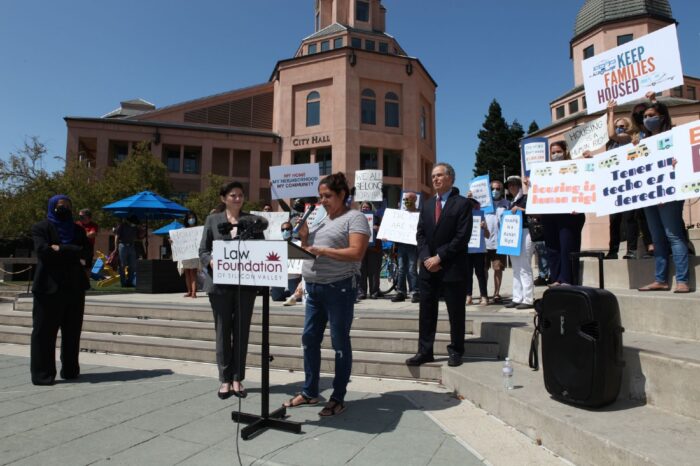Top Class Actions’s website and social media posts use affiliate links. If you make a purchase using such links, we may receive a commission, but it will not result in any additional charges to you. Please review our Affiliate Link Disclosure for more information.

Celerina Navarro, one of six lead plaintiffs in a housing discrimination class action lawsuit against the city of Mountain View, California, that has implications in America’s homeless crisis, has faced her share of difficulties and hard choices.
Navarro and her growing family have lived in the Silicon Valley community, where Google has headquarters, since 2002; her two children attend Mountain View schools, and she receives treatment at a local hospital for a brain tumor, according to the complaint in the lawsuit, filed Wednesday.
In 2015, Mountain View rent prices, which had been steadily rising for years, finally got to the point where Navarro and her family couldn’t afford an apartment. So, the Navarro family moved into a recreational vehicle that could offer them shelter at a lower cost and help them maintain access to their community.
That last resort is in jeopardy, now.
In 2020, Mountain View added another obstacle to Navarro’s life when the city council passed an ordinance that bans RV parking on any street narrower than 40 feet wide. That means that about 83 percent of city Mountain View’s streets are not available to Navarro, according to local news outlet Mountain View Voice.
The ban was quickly challenged in a referendum but passed with about 57 percent of the vote, and the city council re-approved it earlier this year.
The RV parking ban was written as a traffic safety measure. But Michael Trujillo, staff lawyer for the Law Foundation of Silicon Valley and an attorney for the plaintiffs in the lawsuit, say the city was really trying to effectively outlaw living in RVs.
“Absolutely any argument from the city that this is about traffic safety is really pretextual and I think that’s evident in the legislative history of these ordinances,” Trujillo said.
He said the RV parking ban has gone through several iterations that make it clear what the actual intent always was.
“From public comments and comments from city council members, the rationale for implementing this is some folks in the city just wanting not to see RVs in public,” Trujillo said.
Janet Werkman, a volunteer with Mountain View Housing Justice, said the lawsuit was welcome news — the ban was overbroad and unnecessary, she said.
“Certainly there are places where you don’t want large vehicles parked, and that’s completely understandable, but you can go to those places and put in the specific bans in the places that you need them,” Werkman said. “But that’s not what they did. They redefined narrow streets to streets defined as 40 feet or less — so that’s the vast majority of the streets.”
She acknowledged, though, that there are no easy solutions to the Bay Area’s housing crisis.
“It’s gonna take a long, long time, because the problem’s been growing for a long time, and in spite of all the lip service, we’re not making progress,” Werkman said. “For every affordable housing unit built, two more families become homeless. There are many actions and policies that need to change before we start to get ahead of it.”
It’s a problem that has also been exacerbated by the pandemic, she added.
“I’ve talked to a couple families that have gotten RVs since the pandemic started so they used their savings to buy an RV, and that’s where they’re living now,” Werkman said.
Many ordinances similar to the one in Mountain View have been implemented, and have faced legal challenges, in California over the years.
In 2018, a federal judge blocked a San Diego ordinance that served as a blanket ban on living in vehicles and parking oversize vehicles on city streets between 2 a.m. and 6 a.m. But the next year, the city passed a narrow ordinance prohibiting sleeping in cars overnight, or at all near schools and in residential areas.
The city council in Los Angeles also voted unanimously in 2019 to reinstate a ban on living in vehicles near schools and in residential areas.
Trujillo said the plaintiffs in the Mountain View lawsuit are seeking to encourage their city to take a different approach to dealing with vehicle habitation and homelessness, problems he said stem from sky-high housing prices.
“Cities cannot just pile on punitive measures, whether they be camping bans or vehicle habitation bans or RV parking bans,” he said. “They need to try to do something about the problem which is really these cities’ failure to actually provide enough housing.”
The average price of a home in Mountain View was nearly $2 million in June 2021, significantly above the current national average of $293,000, and up more than 100% since as recent as 2012, when a home in the city averaged about $765,000, according to Zillow.
Rental prices, meanwhile, are just as bad — the average rent in Mountain View, according to RentCafe.com, is $2,933 per month, more than double the national average of $1,482.
In Mountain View, housing is so unaffordable that many of the plaintiffs on the lawsuit have no other choice but to live in recreational vehicles, Trujillo said.
“Two of our named plaintiffs in particular have severe disabilities that actually require them to remain within walking distance of their medical facility as a matter of life and death,” Trujillo said. “So these are actually very vulnerable folks who are just doing their best to stay in their communities where they have connections, to stay in the support networks that they’ve grown up with.”
Mountain View city council members declined to be interviewed for this story, but the city issued a statement saying it is “currently evaluating” the class action lawsuit filed over the RV parking ban.
“The ordinance affects all oversized vehicles parked on a narrow street,” the city said. “Due to their size, an oversized vehicle on a narrow roadway can encroach into the vehicle lane of traffic, which can increase the risk of collisions for motor vehicles and bicycles as well as makes it more difficult for emergency and critical service vehicles to navigate the street safely.”
The city said it expects installation of “no parking” signs for oversized vehicles to begin later this month.















14 thoughts onBay Area City’s RV Parking Ban Really Designed to ‘Banish’ Low-Income Residents, Lawsuit Claims
Please this includes me